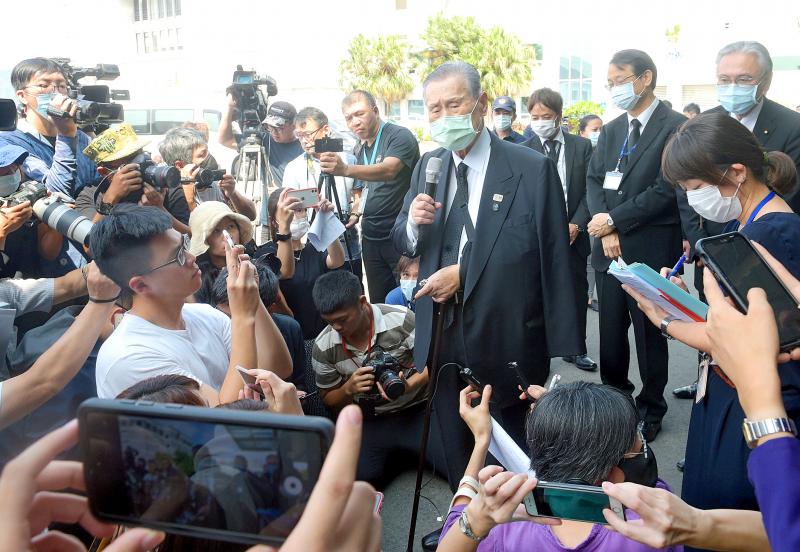Using military force to resolve conflict is no longer workable in this new era, which requires peaceful discussion, former Japanese prime minister Yoshiro Mori said yesterday before leaving Taipei.
Mori made the remarks at a news conference in front of the EVA Sky Jet Center at Taipei International Airport (Songshan airport), after leading a delegation to attend the official memorial service for former president Lee Teng-hui (李登輝) in New Taipei City’s Tamsui District (淡水).
This was Mori’s second trip to mourn Lee; his last was on Aug. 9.

Photo: Chang Chia-ming, Taipei Times
Although he walked with a crutch, Mori, 83, chose to stand right in front of reporters, instead of at a distance as was planned.
Asked about this trip to Taiwan and his advice for new Japanese Prime Minister Yoshihide Suga regarding Taiwan policy, Mori said that he represented the Japanese government in paying tribute to Lee.
“With Lee’s passing, our era has ended,” as he himself had also retired from politics, Mori said through an interpreter.
The global situation will become more complicated, he said, adding that countries are facing their own problems, such as the UK leaving the EU, or other disputes related to the economy, but all conflicts should be resolved through peaceful discussion.
The era when people used military force to resolve conflict or suppress dissent, such as in Lee’s and his own times, has ended, he said.
Young people should seek to collaborate, whether through music, sports or economic cooperation, said Mori, who is president of the Tokyo Organizing Committee of the Olympic and Paralympic Games.
Lee’s career reflected the importance of peace, freedom and democracy, he added.
Asked if Taiwan and Japan might develop security cooperation in the face of China’s military intimidation, Mori said that security issues do not only exist between Japan and Taiwan.
As the world is in a state of tension, military confrontation is no longer workable, he said.
The Olympic Games can only be held when the world is peaceful, he said, adding that he hopes vaccines for COVID-19 will be available soon and the Games will be staged next summer as scheduled.
During his meeting with President Tsai Ing-wen (蔡英文) at the Presidential Office Building on Friday, Mori said that this might be his last trip to Taiwan due to his age.
Mori said that before he departed for Taiwan, Suga called him on Thursday and expressed the hope of talking with Tsai over the telephone if there was an opportunity.
The interpreter did not translate that part into Chinese.
Asked if a telephone call between Tsai and Suga would be arranged, the Japan-Taiwan Exchange Association and Taiwan-Japan Relations Association said that there is no plan for such a call.
Additional reporting by CNA

Taiwan is stepping up plans to create self-sufficient supply chains for combat drones and increase foreign orders from the US to counter China’s numerical superiority, a defense official said on Saturday. Commenting on condition of anonymity, the official said the nation’s armed forces are in agreement with US Admiral Samuel Paparo’s assessment that Taiwan’s military must be prepared to turn the nation’s waters into a “hellscape” for the Chinese People’s Liberation Army (PLA). Paparo, the commander of the US Indo-Pacific Command, reiterated the concept during a Congressional hearing in Washington on Wednesday. He first coined the term in a security conference last

Prosecutors today declined to say who was questioned regarding alleged forgery on petitions to recall Democratic Progressive Party (DPP) legislators, after Chinese-language media earlier reported that members of the Chinese Nationalist Party (KMT) Youth League were brought in for questioning. The Ministry of Justice Investigation Bureau confirmed that two people had been questioned, but did not disclose any further information about the ongoing investigation. KMT Youth League members Lee Hsiao-liang (李孝亮) and Liu Szu-yin (劉思吟) — who are leading the effort to recall DPP caucus chief executive Rosalia Wu (吳思瑤) and Legislator Wu Pei-yi (吳沛憶) — both posted on Facebook saying: “I

The Ministry of Economic Affairs has fined Taobao NT$1.2 million (US$36,912) for advertisements that exceed its approved business scope, requiring the Chinese e-commerce platform to make corrections in the first half of this year or its license may be revoked. Lawmakers have called for stricter enforcement of Chinese e-commerce platforms and measures to prevent China from laundering its goods through Taiwan in response to US President Donald Trump’s heavy tariffs on China. The Legislative Yuan’s Finance Committee met today to discuss policies to prevent China from dumping goods in Taiwan, inviting government agencies to report. Democratic Progressive Party Legislator Kuo Kuo-wen (郭國文) said

The Ministry of Economic Affairs has fined Taobao NT$1.2 million (US$36,900) for advertisements that exceeded its approved business scope and ordered the Chinese e-commerce platform to make corrections in the first half of this year or its license would be revoked. Lawmakers have called for stricter supervision of Chinese e-commerce platforms and more stringent measures to prevent China from laundering its goods through Taiwan as US President Donald Trump’s administration cracks down on origin laundering. The legislature’s Finance Committee yesterday met to discuss policies to prevent China from dumping goods in Taiwan, inviting government agencies to report on the matter. Democratic Progressive Party